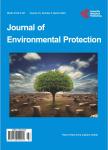A Polymerase Chain Reaction Based DNA Fingerprinting Technique: Amplified Fragment Length Polymorphism for Molecular Typing of Perchlorate Reducing Bacteria
A Polymerase Chain Reaction Based DNA Fingerprinting Technique: Amplified Fragment Length Polymorphism for Molecular Typing of Perchlorate Reducing Bacteria作者机构:Aavanira Biotech Pvt. Ltd. Pune India Department of Biochemistry University of Pune Pune India Ministry of Environment & Forests New Delhi India
出 版 物:《Journal of Environmental Protection》 (环境保护(英文))
年 卷 期:2014年第5卷第12期
页 面:1111-1115页
学科分类:1002[医学-临床医学] 100214[医学-肿瘤学] 10[医学]
主 题:AFLP—Amplified Fragment Length Polymorphism Arthrobacter Ammonium Perchlorate Bio-Degradation
摘 要:Genetic profiling of environmentally important organisms is very essential for easy identification of biodegrading bacteria. In the previous study, we have reported the perchlorate biodegrading bacteria and characterized them by biochemical analysis and 16 S sequencing. We have observed a very similar isolates of Arthrobacter (Actinobacteria) degrading 4.1 mM and 4.7 mM of ammonium perchlorate [1] 08D0C9EA79F9BACE118C8200AA004BA90B02000000080000000E0000005F005200650066003300390038003100390037003300340037000000 . In this study, we report PCR based DNA fingerprinting technique to generate the genomic signature of these closely related group of Arthrobacter species. This study also effectively generates unique genomic signature for each of these isolates that has potential for use in molecular monitoring as well as for tracking genomic variation and rearrangements.



